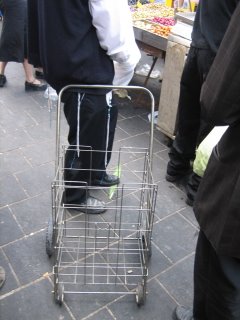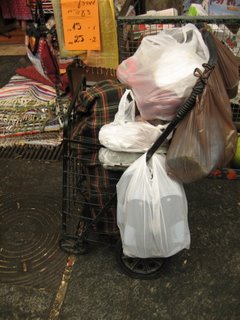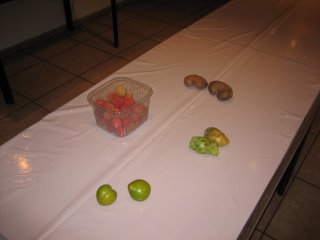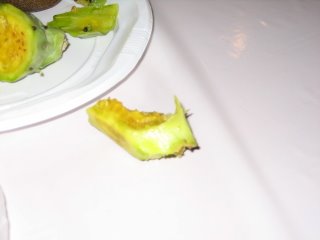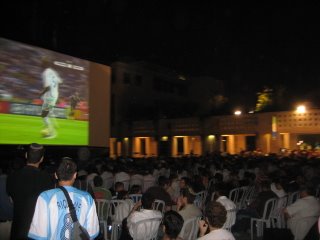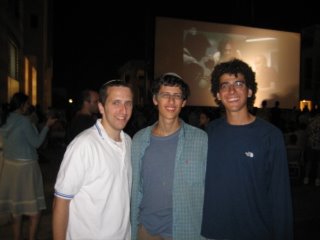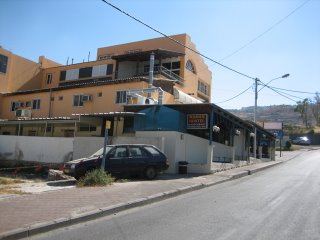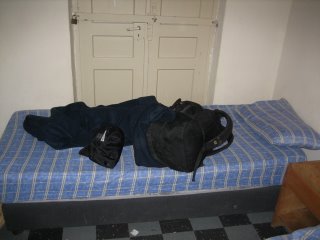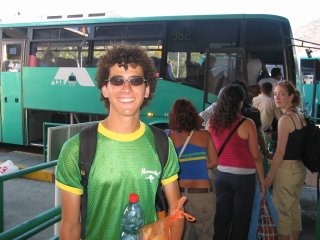Before I write this post, I want to give you an update on my security situation. While the northern part of Israel is under bombardment from Hezbollah rockets, life in the center of the country is continuing almost as normal. Aside from the eastern Negev, I would consider Jerusalem to be one of the safest places in the country right now. Besides paying more attention to the news than normally and not riding buses, my life is not much different than before.
Now on to the most massive post of the summer (hey, I have to recap two weeks)
The last week has been hectic to say the least. Follow this equation:
Current situation in the north + Ian's busy schedule + no internet in my room on Wednesday or Thursday = limited time for blogging
Another possible to that solution is that I have plenty to write about. So let's get started.
We last left off (aside from an expose on the shuk bag phenomena) with the first meeting of the exotic fruit tasting society, which means that more than a week has passed since I updated you on what I am doing.
Let me take you back in time nearly two weeks to the Israel Track and Field Championships, which I covered for the Post. These were two exciting nights at Hadar Yosef Stadium in Tel Aviv. I wrote two articles for the paper. If you click on these links, you will find evidence of my work
here,
here and not here. Having covered the Michigan track team for two years, you get spoiled with following world-class athletes on a regular basis. In Israel, there are two track and field athletes that are competitive on an international level. So, it's a change of pace (literally).
A week from Thursday, I volunteered with the maintenance staff at Alyn Hospital again (Did I even mention the first time?). This time I painted the door to the generator room. Here is my mindset: I am happy to paint the door because people who would paint it otherwise have more important things to do and can't be bothered with this type of minutia.
The next day, Avery arrived for his weekend off. He took a cab from the youth village to my apartment to drop off his bags. We picked up another cab and went to go see Pirates of the Caribbean (for those that remember an earlier post of mine, I ranked this as one of the most highly anticipated movies of the summer). I don't think it lived up to the hype, but then again, how many sequels aside from D2 actually do?
After the movie, which was in the industrial neighborhood of Talpiyot on the other side of town from my apartment, I decided that a pleasant stroll through the city would give us the forum to shmooze for a while and allow Avery to see the city. After the trek, I took him to the four shekel falafel place before we went to the shuk.

For those that don't know, Avery is an expert when it comes to the kitchen. He knows his way around the kitchen almost as well as my dad knows his way around Detroit, which made this excursion to the shuk one of the most highly anticipated shuk visits of the summer (There were posters up and down Agrippas announcing Avery's arrival right next to the Shneersin Messiah posters). Avery was in heaven and the only way that he could have had a better time in the shuk would've been if there wasn't a language barrier. Nonetheless, let me recap what we purchased:
Half watermelon, three kilos red grapes, mangos, dried apricots, prickly pineapple, little pear, hummus, labane, pita, and probably something else (hey, it's been two weeks). This was also the site of Ian taking pictures for the shuk bag feature.
After the shuk, we went to Shabbat services at Shirah Chaddashah, a cutting-edge orthodox synagogue in the German Colony. We followed that up with the Shabbat dinner with some friends at their hotel (thank you very much, once again). Avery and I both reached the state of
food coma.
We went back to my apartment after dinner and convened the second meeting of the exotic fruit tasting society. Ian and Ari tasted dragon fruit, little pear, and prickly pineapple. In conclusion. the prickly pineapple is the best pineapple we have every eaten. The other two weren't so great. Sorry about the lack of pictures from this event, we didn't want to ruin the spirit of Shabbat. After the dessert tasting, we went to a
tish in Mea Sha'arim, which is one of the most interesting things you will every see. Sorry about the lack of pictures, I didn't want to lose my life by snapping a closeup of the rebbe.
On Saturday, we slept in until 12:15. I guess we needed the sleep or something. For lunch, we went to some other friends' hotel (thank you very much) and again achieved the state of food coma. In the afternoon, we went for a walk to the kotel.
On Saturday night, we went to get some good hummus, saw the satire
Thank You for Smoking at the last night of the Jerusalem Film Festival and went to the Marakiah (a soup restaurant that doubles as a bar). We (Ian, Ari and Peter) had been searching for this ever-elusive establishment for a couple weeks, which made finding it that much sweeter. (Let's just say that since that first night, we have been back there twice and plan to go again tonight)

Avery went back to his group on Sunday morning. On Sunday night, I covered another

On Tuesday my friend Hy, who staffed the Detroit Teen Mission before it ended prematurely becuase of the current situation, spent the night on my floor. Hy is better known at the former bat boy for Groves High School baseball and one of the most talented cowbell musicians in the world. After I volunteered at Alyn again, we went out to dinner with Erick and his family (thank you very much).
Wedenday morning, Hy and I volunteered at one of the community gardens that I have been working at all summer long. We worked with a group of 40 kids from a neighborhood day camp to make a bench out of rubber tires and mud. Despite Hy's aversion to getting dirty, we had a great time (except when the kids decided to throw stones at Hy).


On Thursday, I woke up early to catch a bus to Ben Gurion Airport to welcome a Nefesh b'Nefesh flight of Americans making Aliyah. I was supposed to meet the bus at 6:45, but some alarm issues arose and I didn't get out of bed until 6:55. I sprinted to the entrance to the city and caught the bus before it got on the highway.
The welcoming ceremony was under a canopy in the middle of the runway at Ben Gurion. After the passengers deplaned, they came to the site of the ceremony where they hugged and kissed family who came to meet them. It was a very emotional experience, especailly considered the current situation. Bibi Netanyahu addressed the new Olim and stressed the importance of Aliyah.
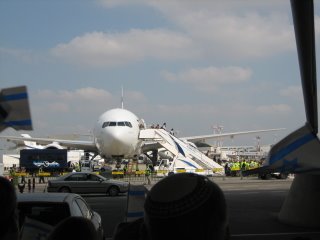
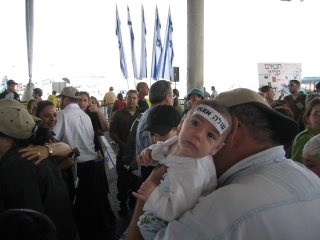
That night, I went to dinner at Luigi's with the rest of the Jewish Academy (my high school) contingent in Israel. The food was good, the company was even better (which says a lot considereing the quality of the food).

It wasn't that late of a night, though. I had to catch a 7:15 bus to the south, where I spent shabbat. We did a brief tiyyul at Ein Ovdat (next to Sde Boker [site of David Ben Gurion's grave and house]). Check out this sweet sign on the trail.

Afterwards, we went to Beer Sheva for lunch and to hear a speaker talk to use about how Ethiopian Jews maintian aspects of their culture, instead of completely adopting Israeli culture.
For Shabbat, we stayed a hostel in Yerucham, a development town directly in the middle of nowhere (it's about 15 minutes from Dimona and 40 from Beer Sheva). Yerucham is known as one of the poorer devleopment towns in Israel and has a very large immigrant population. On Saturday afternoon, we went for a walk around the town in which our tour guide explained to us different strategies the city has employed to vitalize. (A brief aside: The Shabbat food was not very spectacular, maybe even worse than Fayetteville, Ark where they had trouble comprehending the term "vegetarian")
On Saturday night, we got back to Jerusalem at about 11:30. I went to Zion Square to drink tea and people watch with Peter.
Yesterday, I had a
track meet to cover in Tel Aviv. After the meet, I went out with Peter and Erick (who went home this morning) to a really cool bar called D1. It was as if the owners just took an abadnoned building, threw in chairs, tables, a bar, and some record covers on the wall. Erick taught me and Peter how to play Shesh Besh (backgammon).

Boy, this post turned boring for the final five or six days. I promise to blog more often. By now, I just want to use this post as a reference to remember what I did during these last two weeks. In the next week, I promise a post about movies that I have seen, an explanation about what I do at work and another expose about a troubling part of Israeli society.


































